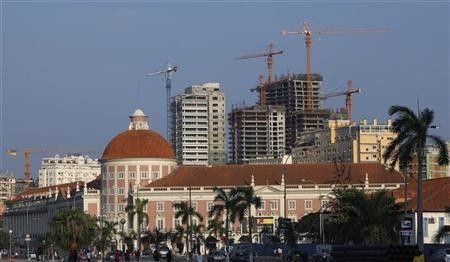Sorry, Portugal: South Africa's Standard Bank Poised To Horn In On Angola's Oil Wealth

The tables have long been turning on Portugal in the oil-rich country of Angola, and now regional neighbors are looking to get in on its huge oil wealth.
The southern African country is experiencing rapid growth with every drop of crude it produces, while a recession-weary Portugal -- Angola's former colonial master -- struggles with massive debt. As Portugal's influence wanes, Standard Bank (JSE: SBK), one of the largest financial institutions in South Africa, is eyeing Angola's high-revenue corporations. The lender, based in Johannesburg, now boasts a better credit rating than its most formidable Portuguese counterpart. Banco Espirito Santo SA (ELI:BES), Portugal’s largest publicly traded lender, has seen its rating plummet to a non-investment grade Ba3, according to Moody's.
"We are the only bank in the market that is a subsidiary of an investment-grade bank,” Pedro Coelho, CEO of Standard's Angola branch, told Bloomberg. “This brings us to an interesting position with clients who are concerned with the quality of the balance sheet.”
Standard Bank has been pursuing a new strategy of focusing on the African continent while shrinking its footprint in developing countries around the world. The decision is paying off -- last year, the lender increased its revenues from African operations by 38 percent. Standard's Angolan subsidiary started operations in the capital city of Luanda in 2010 and plans to have branches across the country by the end of this year.
The bank's focus on Angola is not on retail banking but in the corporate and financial sectors -- exactly where the money is. Oil revenues are enriching foreign and domestic corporations in Angola, prompting unprecedented growth in a country that emerged from a decades-long civil war as recently as 2002. Luanda is fast becoming a global commercial hub and rebuilding its infrastructure at a breakneck pace; it ranks as the most expensive city in the world for expats.
Angola exports about 1.7 million barrels of crude per day, and that figure is expected to top 2 million bpd by next year. Estimated reserves exceed 12.7 billion barrels. Hydrocarbon revenues have contributed to a GDP per capita of $5,600, while Angola's economy is one of the fastest-growing on an already thriving continent. Angolan GDP expanded by 8.1 percent last year, according to the World Bank, and is on track to grow another 7.2 percent this year.
But Portugal still has some strong connections to Angola, which achieved independence in 1975. Portuguese remains still the official language, and tens of thousands of Portuguese nationals have residency in Luanda, seeking to escape bleak economic realities in their homeland. Indeed, the small European country is struggling with pinched productivity and massive debt, which soared to 127.2 percent of GDP in the first quarter of this year. Its biggest banks hold more than 10 percent of that debt, making them increasingly unreliable partners for Angola's oil moguls.
Meanwhile, Angola has been increasing its own shareholdings of Portuguese companies; the state oil company Sonangol has major stake in a number of banks and firms including Millennium BCP, Portugal's biggest private bank, and the energy firm Amorim Energia. Standard Bank is well-positioned to fill in where Portuguese banks cannot, which could hasten Angola's pivot away from its European past and toward a more African future.
© Copyright IBTimes 2024. All rights reserved.





















